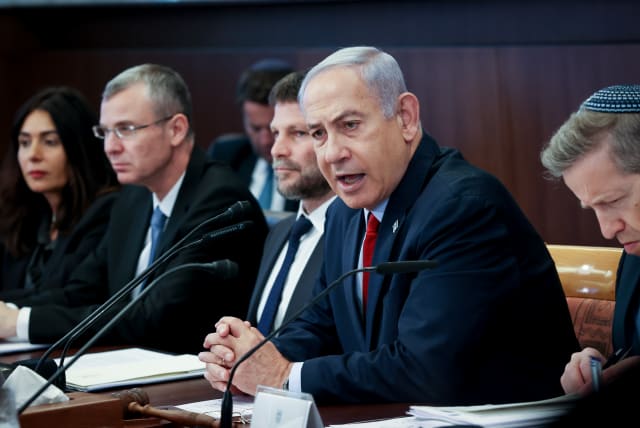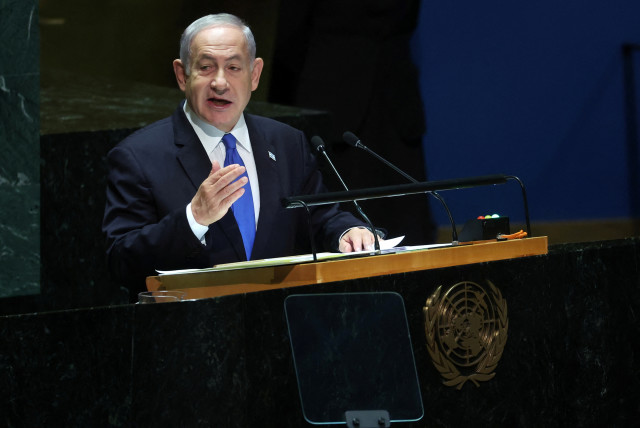Netanyahu must not let his coalition interfere with Saudi normalization - editorial

The vision of a new Middle East that Netanyahu touted during his UNGA speech will have to overcome numerous hurdles, both from within Israel and on the global stage.
Israel is poised on the brink of forging new, transformative relations with Saudi Arabia – an unprecedented development that Prime Minister Benjamin Netanyahu passionately advocated for during his recent address at the United Nations in New York. He has a bold vision for a reinvigorated Middle East, a vision shared by our Gulf counterparts, three years after the historic Abraham Accords reshaped regional dynamics.
However, this vision is not without its challenges, both on the international stage and within our borders. In the midst of these winds of change sweeping across the Middle East, Netanyahu faces a series of hurdles, some of which are domestically rooted.
While we may not have direct control over the processes of other nations, it is crucial to examine how our own political landscape may hinder these historic agreements. An internal crisis, stemming from the ongoing judicial reform, threatens to cast a shadow over Israel's credibility on the global stage, giving rise to uncertainties in the minds of potential partners. Another potential obstacle lies within Netanyahu's own coalition, where certain far-right partners may obstruct a deal with Riyadh.
At the same time, it is paramount that we prioritize our national interest, seeking relations with Saudi Arabia not at any cost, but as an integral part of our broader foreign policy objectives. Recognizing Saudi Arabia's pivotal role both regionally and globally underscores the urgency of this endeavor.
MBS affirms normalization is approaching
Notably, Saudi Crown Prince Mohammed bin Salman expressed a growing closeness to normalization with Israel in a recent interview with Fox News. His words carry historical significance, as discussions on ties with the Kingdom were once only held in hushed tones. Now, both sides openly acknowledge their desire for a transformative agreement.
It is important to recognize that Saudi Arabia has its own set of demands, including a deep concern for the Palestinian issue, regional stability, and its desire for increased US support. Amid these considerations, numerous ideas are being explored to bolster US commitments in the region, benefiting not only Israel but also Saudi Arabia.
A recent discussion by the Jewish Institute for National Security Affairs (JINSA) advocated for a US-Israel mutual defense treaty, arguing that such an alliance would serve American strategic interests by strengthening our longstanding military, intelligence, and high-tech partnership. This proposal could dovetail with potential Israel-Saudi normalization, creating a new US-led regional security framework capable of addressing shared threats and responsibilities effectively and equitably.
Netanyahu declared in the United States that he maintains control over his coalition, emphasizing that his partners in government do not dictate his course of action. It is imperative that he remains true to his assertion made to CNN that his coalition will not obstruct a potential agreement with Saudi Arabia. In the event that some within the coalition choose to stand in the way, Netanyahu must demonstrate unwavering commitment to our national interest, even if it means considering new coalition partners to facilitate the realization of a Saudi deal.
Recent controversies within the coalition, such as concerns over the Palestinian Authority receiving vehicles and rifles, highlight the potential pitfalls of coalition politics when they clash with the broader national interest. While the security implications of such decisions must be carefully weighed, it is imperative that politics do not obstruct policies aimed at the long-term success of our nation. Netanyahu should initiate a transparent dialogue with his coalition partners regarding the necessity of strengthening ties with Riyadh, thereby preempting any future crises.
At the end of the day, we expect our leaders to act in accordance with the national interest and not be swayed by narrow political considerations. And yet, there may be a way to square this particular circle: according to polls, a plurality of Israelis support a Saudi deal, even if it would entail concessions to the Palestinians. A plurality would also support Yair Lapid’s Yesh Atid or Benny Gantz’s National Unity party joining the coalition if Netanyahu’s far-right partners bolt due to a deal.
Netanyahu should press forward in exploring a potential US-Israel-Saudi deal, secure in the knowledge that many Israelis will support him, even if his coalition partners do not.
Jerusalem Post Store
`; document.getElementById("linkPremium").innerHTML = cont; var divWithLink = document.getElementById("premium-link"); if (divWithLink !== null && divWithLink !== 'undefined') { divWithLink.style.border = "solid 1px #cb0f3e"; divWithLink.style.textAlign = "center"; divWithLink.style.marginBottom = "15px"; divWithLink.style.marginTop = "15px"; divWithLink.style.width = "100%"; divWithLink.style.backgroundColor = "#122952"; divWithLink.style.color = "#ffffff"; divWithLink.style.lineHeight = "1.5"; } } (function (v, i) { });

